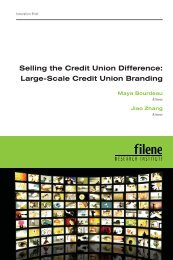Credit Union and Cooperative Patronage Refunds - Filene ...
Credit Union and Cooperative Patronage Refunds - Filene ...
Credit Union and Cooperative Patronage Refunds - Filene ...
You also want an ePaper? Increase the reach of your titles
YUMPU automatically turns print PDFs into web optimized ePapers that Google loves.
Figure 2: Contrast Statutes Governing Co-ops<br />
Federal L<strong>and</strong> Bank<br />
Sub-T co-op Rural electric co-op<br />
(<strong>and</strong> federal<br />
credit unions)<br />
State-chartered<br />
credit union<br />
Statute 26 U.S.C. 1382 26 U.S.C. 501(c)(12) 501(c)(1) 26 U.S.C. 501(c)(14)<br />
Exempt or nonexempt Nonexempt Exempt Exempt Exempt<br />
Are patronage earnings<br />
allocated or apportioned<br />
to individual members?<br />
Notification of allocation<br />
to member required?<br />
When does member pay<br />
income tax, if ever?<br />
Is patronage earnings<br />
part of capitalization of<br />
co-op?<br />
How are proceeds<br />
distributed at dissolution<br />
of co-op or credit union?<br />
When are income taxes<br />
paid by the co-op or<br />
credit union?<br />
Yes. Must be allocated<br />
to qualify for tax<br />
deduction allowed for<br />
patronage-sourced<br />
earnings. “Allocation”<br />
is apportionment plus<br />
“notice.”<br />
Yes. Co-op is required<br />
to give specific written<br />
notice of member’s prorata<br />
allocated patronage<br />
earnings.<br />
In the year that member<br />
received qualified written<br />
notice. Members pay tax<br />
on entire distribution even<br />
though no more than 20%<br />
is paid in cash (if business<br />
with co-op was taxable as<br />
income or deductible as<br />
expense).<br />
Yes. Allocated equity is<br />
usually major portion of all<br />
equity capitalization. This<br />
equity is redeemed as <strong>and</strong><br />
when co-op has excess<br />
working capital.<br />
On basis of historical<br />
patronage. Articles <strong>and</strong>/or<br />
bylaws may limit length of<br />
look back.<br />
On all nonpatronagesourced<br />
income <strong>and</strong><br />
patronage income that is<br />
not allocated.<br />
Not required. Minimum<br />
requirement is to maintain<br />
records showing each<br />
member’s interest in<br />
co-op’s earnings <strong>and</strong> equity.<br />
Some notify members of<br />
apportionment of each<br />
member’s pro-rata portion<br />
of patronage earnings.<br />
No. But recommended<br />
practice is to specifically<br />
notify members of pro-rata<br />
portion of apportioned<br />
earnings. Notification is<br />
seen as opportunity to<br />
communicate about co-op<br />
values.<br />
Upon redemption of<br />
allocated equity in cash<br />
paid to the member by<br />
co-op (if purchase was for<br />
tax-deductible business<br />
purpose).<br />
Yes. Apportioned <strong>and</strong><br />
allocated equity is usually<br />
major portion of all equity<br />
capitalization. This equity<br />
is redeemed as <strong>and</strong> when<br />
co-op has excess working<br />
capital.<br />
On basis of historical<br />
patronage. Articles <strong>and</strong>/or<br />
bylaws may limit length of<br />
look back.<br />
If more than 15% of<br />
income arises from<br />
unrelated nonmember<br />
business.<br />
Not required. If the<br />
earnings are not<br />
apportioned, the earnings<br />
are accounted for in an<br />
unallocated surplus.<br />
No. Practice is mixed.<br />
Some do notify but others<br />
do not notify. Notification<br />
seen as an opportunity<br />
to communicate with<br />
members about co-op<br />
values.<br />
Upon redemption of<br />
allocated equity in cash<br />
paid to the member by<br />
co-op (if loans or services<br />
were for tax-deductible<br />
purpose).<br />
Mixed. Some promote<br />
member ownership of<br />
allocated equity capital,<br />
but others are silent about<br />
that feature of co-op’s<br />
capitalization.<br />
L<strong>and</strong> Banks—usually<br />
historical patronage, <strong>and</strong><br />
governed by articles of<br />
incorporation or bylaws.<br />
(<strong>Credit</strong> unions—to<br />
members on basis of share<br />
ownership).<br />
Never.<br />
No. Earnings are<br />
unallocated. Most earnings<br />
are accounted for as<br />
“undivided earnings.”<br />
No. But notice of cash<br />
patronage refunds is<br />
seen as an opportunity<br />
to communicate with<br />
members about co-op<br />
values.<br />
Upon receipt of cash<br />
refund paid to member<br />
by credit union (if loans<br />
or services were for taxdeductible<br />
purpose).<br />
No. Equity is all<br />
unallocated. On the other<br />
h<strong>and</strong>, we know that<br />
members’ businesses<br />
generated earnings that<br />
make up the undivided<br />
equity.<br />
Governed by state law<br />
where incorporated rather<br />
than federal law.<br />
If more than 15% of<br />
income arises from<br />
unrelated nonmember<br />
business.<br />
report, when we discuss tax implications for credit unions. Rural<br />
electric co-ops will be particularly relevant then because their tax<br />
exemption has been criticized even more harshly than that of credit<br />
unions. Moreover, in cases where members are litigating the redemption<br />
of their allocated equity, rural electric cooperatives are of interest<br />
26








